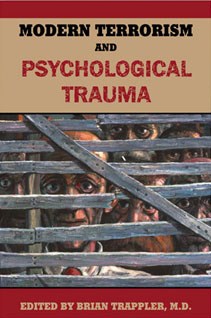 |
| Only $6.50 (plus shipping)
|
Modern Terrorism and Psychological Trauma
Modern Terrorism and Psychological Trauma brings together a rich collection of insightful studies by leading psychiatrists, psychologists, and other mental-health professionals, to provide readers with a deep understanding of the nature of psychological trauma induced by modern terrorism.
Most fundamentally, through studies of victims of terrorism in America on 9/11 and afterward in England, Spain, Israel, and other countriesas well as studies of pre-9/11 victims, especially Holocaust survivorsthis anthology clearly explains:
The ways that mental-health professionals conceptualize and analyze the nature of terror-induced psychological trauma at both the individual and the community levels
why research findings on terror-related psychological trauma have profound treatment implications for men and women of every age, socioeconomic status, religion, nationality, and ethnic background
how psychotherapists can achieve more enduring alleviation of symptoms by conceptualizing terrorism-related symptoms on an acute versus continuous stress paradigm basis.
Modern Terrorism and Psychological Trauma is more than an invaluable primer, however, because Dr. Trappler organizes the seminal literature anew based on his original theoretical perspective, which approaches the spectrum of psychological trauma as a multi-layered hybrid of events and uses a novel, multi-dimensional model to explain the entire spectrum of psychopathology related to terrorism. In its simplest form, the Trappler model posits that most victims have some stress-related symptoms following exposure to a discrete terrorist attack, while fewer victims are left with enduring symptoms of classic PTSD. The more complex form of trauma pathology evolves from a prolonged relationship between the victim and the perpetrator. Here Dr. Trappler deviates from PTSD reductionism and explores object-relations and Jungian theories to explain the insidious transformative effect of “continuous terror” on the victim. The persevering effect of trauma in the absence of adequate caretaking is both supported by the data presented in the final chapters of the book and hauntingly captured by the cover image, which metaphorically depicts the inescapable imprisonment of the unrecovered victim held hostage to his inner world of trauma-repetitions.
Endorsements
| The mental health issue of the 21st century will be, unfortunately, the effects of terrorism on the individual survivor and society at large. Dr. Trappler, who has devoted a large part of his career to providing psychiatric services to Holocaust survivors and their families, has edited some of the major papers published in the field on the effects of modern terrorism, in his new book “Modern Terrorism and Psychological Trauma”. He has organized this book into three sections: One, the effects of a single traumatic incident; two, the effects of continuous trauma; and three, the enduring effects of PTSD. Clinicians, scholars, and ordinary people who are interested in learning more about the effects of traumatic events on the individual survivors and society at large would benefit from this important new book. |
Steven Friedman, Ph.D., ABPP
Professor of Clinical Psychiatry,Director, Phobia and Anxiety Disorders Clinic
SUNY Downstate Medical Center, Brooklyn, NY |
 |
The trauma of terrorism and its consequences now affect an ever-widening group of human beings. Dr. Brian Trappler has compiled and contributed to a book that should be read by anyone with a keen interest in the emotional impact of terror attacks anywhere in the world. The editor is very well versed in the field of trauma and, as a colleague, I have personally benefitted from the dynamic training sessions he has offered on PTSD.Among the many strengths of this book is the clarity of its organization. It is a comprehensive overview of modern terrorism and its psychological impact, offering a diverse selection of material by established clinicians on the subject. This is “must reading” for clinicians and researchers alike, and will also be invaluable in educational and training settings.Carolyn Wells, LCSW
Director of Community Services,
NYS OMH Certified Disaster Mental Health Trainer
New York State Office of Mental Health |
 |
This is a timely book that should be of interest to clinical professionals, academics, and laypersons who want to learn more about the impact of terrorism on psychological well-being. As a geriatric psychiatrist, I found the section on the enduring effects of PTSD to be the best compilation of work on this subject. Trappler, who has written seminal papers on long-term effects of PTSD among Holocaust survivors, has assembled a distinguished group of writers who provide a global perspective on PTSD and terrorism. I wholeheartedly recommend this book.Carl I. Cohen, M.D.
Professor & Director
Division of Geriatric Psychiatry
SUNY Downstate Medical Center |